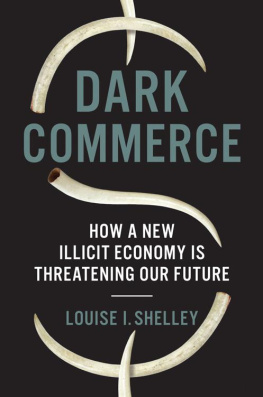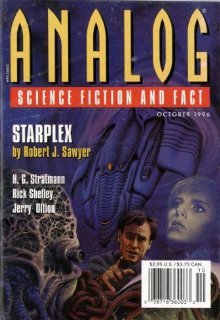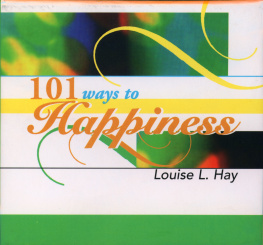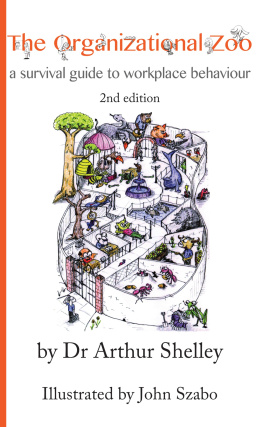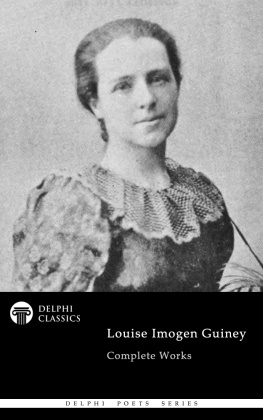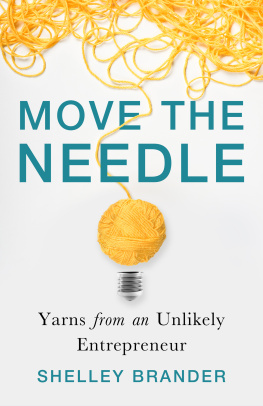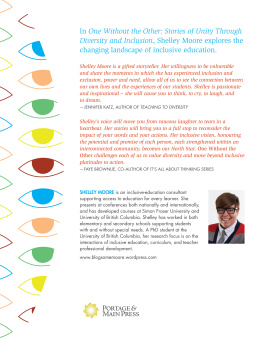Louise I. Shelley - Dark Commerce
Here you can read online Louise I. Shelley - Dark Commerce full text of the book (entire story) in english for free. Download pdf and epub, get meaning, cover and reviews about this ebook. year: 2018, publisher: Princeton University Press, genre: Politics. Description of the work, (preface) as well as reviews are available. Best literature library LitArk.com created for fans of good reading and offers a wide selection of genres:
Romance novel
Science fiction
Adventure
Detective
Science
History
Home and family
Prose
Art
Politics
Computer
Non-fiction
Religion
Business
Children
Humor
Choose a favorite category and find really read worthwhile books. Enjoy immersion in the world of imagination, feel the emotions of the characters or learn something new for yourself, make an fascinating discovery.
- Book:Dark Commerce
- Author:
- Publisher:Princeton University Press
- Genre:
- Year:2018
- Rating:4 / 5
- Favourites:Add to favourites
- Your mark:
- 80
- 1
- 2
- 3
- 4
- 5
Dark Commerce: summary, description and annotation
We offer to read an annotation, description, summary or preface (depends on what the author of the book "Dark Commerce" wrote himself). If you haven't found the necessary information about the book — write in the comments, we will try to find it.
Dark Commerce — read online for free the complete book (whole text) full work
Below is the text of the book, divided by pages. System saving the place of the last page read, allows you to conveniently read the book "Dark Commerce" online for free, without having to search again every time where you left off. Put a bookmark, and you can go to the page where you finished reading at any time.
Font size:
Interval:
Bookmark:

DARK COMMERCE
Dark Commerce
How a New
Illicit Economy
Is Threatening
Our Future
Louise I. Shelley
PRINCETON UNIVERSITY PRESS
PRINCETON AND OXFORD
Copyright 2018 by Princeton University Press
Published by Princeton University Press
41 William Street, Princeton, New Jersey 08540
6 Oxford Street, Woodstock, Oxfordshire OX20 1TR
press.princeton.edu
All Rights Reserved
Library of Congress Control Number 2018938103
First paperback printing, 2020
Paperback ISBN 978-0-691-20976-0
Cloth ISBN 978-0-691-17018-3
British Library Cataloging-in-Publication Data is available
Editorial: Eric Crahan and Pamela Weidman
Production Editorial: Jill Harris
Cover art and design by Will Brown
Production: Jacqueline Poirier
To all the TraCCCsters past and present who have
done so much to combat illicit trade and to the many
others around the world who do so with much courage
CONTENTS
ACKNOWLEDGMENTS
To write this book, I have been enormously helped by scholars, practitioners, businesspeople, and members of civil society. Fortunately, an increasing number of forums and conferences held in the last few years, both on illicit trade generally and on specific elements of it, have helped me understand this complex topic better.
For this research, my reading has gone beyond my usual fare in the social sciences, business and economics, history, and international relations to include a diverse literature in many fields new to mescience and public health, environmental studies, and cybercrime. I needed to expand my reading in these new fields because the scientific, public health, and environmental communities have all begun to focus on the consequences of illicit trade. Unlike the social science community, these communities do not emphasize these problems as consequences of globalization, more open borders, and the rise of international trade. Nor do they question whether the problems are getting worse as a result of regulation. They see illicit commerce through scientific analyses that measure the extinction of species and provide data on the decline of bird, animal, and fish populations, the destruction of forests and other habitats, and diverse public health indicators. They observe the growth of illicit online marketplaces, such as Silk Road, through data mining and advanced analytics. All these indicators reveal that the growth of illicit activity may be having irreversible impacts on the planet and deleterious effects on human health. Their analyses were invaluable to the development of my understanding of illicit trade.
This reading was essential to my understanding of business trends, in both online marketplaces and the expanding and diverse markets for counterfeits.
A rich and important literature exists about the different components of illicit trade, starting with the pioneering work Illicit, by Moiss Nam, which focuses on the diverse elements of illicit trade such as drug, human, and counterfeit trafficking. Many multilateral organizations, such as the United Nations, Europol, and Interpol, and research-oriented NGOs have published informative studies based on valuable on-the-ground experience.
Many insights have been obtained from fellow academics, but especially from practitioners who confront the realities of illicit trade on a daily basis. I have been fortunate that practitioners on many different continents have helped me understand the corruption, the illicit networks, and the routes that facilitate illicit trade. Many of them I have met through my six-year participation in the Global Agenda Councils of the World Economic Forum on organized crime and illicit trade, my membership in the Global Initiative against Transnational Organized Crime, and my participation in the illicit trade group of the OECD. Practitioners have pointed me to cases or directed me toward online searches of very specific terms that guided me to unusual insights. For example, with this kind of help, I gained knowledge I had lacked about law enforcers who go to the dark side in the cyberworld. Because some of the actual sources of these insights and new information need to stay anonymous, in the notes I often cite news accounts as the source.
The research for the book has taken me to distant locales. In 2015, I spent a quarter of the year on different trips to the Middle East and Asia (China, India, Malaysia, and Taiwan) made possible by my selection as an initial Andrew Carnegie Fellow by the Carnegie Corporation. This fellowship provided me with valuable time for research and writing and was extended to a full two years through the generosity of the president of George Mason University, Angel Cabrera, and the dean of the Schar School of Policy and Government, Mark Rozell. My thinking and writing evolved significantly at the Bellagio Residence of the Rockefeller Foundation, where I was in residence the month before the 2016 elections.
Traveling to the diverse regions discussed here was crucial to my analysis of illicit trade, as many of these regions are key trade hubs, for both the licit and illicit economies. I have traveled to South Africa twice to observe the rhino in its locale and hold discussions with practitioners and researchers trying to save this special, ancient creature. Moreover, I have visited hot spots of illicit trade and money laundering in France, Italy, Panama, Turkey, and the United States, where it is possible to see illicit products sold in plain view. I have also drawn on my past travels to the former Soviet Union and Latin America.
In preparation for writing, I attended many meetings addressing different aspects of illicit trade and sponsored by multilateral bodies in Europe, the United States, and the Middle East, such as the Organization for Security and Cooperation in Europe (OSCE), the Organization for Economic Cooperation and Development (OECD), the United Nations, the World Bank, the Global Agenda Council meetings of the World Economic Forum (WEF), the Global Initiative against Transnational Organized Crime, the Financial Times, the International Institute for Strategic Studies (IISS), NATO, Siracusa International Institute for Human Rights and Criminal Justice, and the Munich Security Forum, as well as international anti-corruption conferences in Malaysia and Panama. At many of these meetings, I have met policymakers, corporate officials specializing in countering illicit trade, and NGO officials often focused on the victims of illicit trade.
I thank the key people who have made many of these groups function well, such as David Luna and the illicit trade group of the OECD; and Adam Blackwell and Christina Bain, with whom I worked particularly closely in recent years on illicit trade within the World Economic Forum. I received invaluable and current information from the listservs and groups in which I participate, including the FININT listserv, the regular publications of the Global Initiative against Transnational Organized Crime, and the Organized Crime and Corruption Reporting Project (OCCRP). Furthermore, the members of both the Association of Certified Anti-Money Laundering Specialists (ACAMS) and the Anti-Corruption Advocacy Group have helped me understand so many different complex financial issues connected to illicit trade, corruption, and money laundering.
I have many people to thank more specifically for reading portions of the manuscript, including Robert Rotberg and Laurence Cockcroft, who helped me improve my writing on corruption and illicit trade. John M. Sellar, Frances Beinecke, and Raisa Scriabine read and helped me improve my thinking and writing on the books environmental analysis; John had the perseverance to work through the whole manuscript, and Raisa read much of it. Solvej Krause read and provided fine suggestions for the introduction. Michael Loughnane helped me with the business side of illicit trade and operations in the cyberworld. Guadalupe Correa-Cabrera and my long-serving and invaluable graduate assistant, Camilo Pardo, were especially helpful in improving my Latin American perspective. Chris Corpora read parts on the development of illicit trade. Kasey Kinnard of TraCCC was invaluable in improving the analysis of the rhino horn trade. Dipanwita Das, my daughter-in-law, provided me with valuable insights on the history of trade in India. My partner, Richard Isaacson, read and reread my analysis, helping me to improve my logic and my writing. He has been with me every step of the way!
Next pageFont size:
Interval:
Bookmark:
Similar books «Dark Commerce»
Look at similar books to Dark Commerce. We have selected literature similar in name and meaning in the hope of providing readers with more options to find new, interesting, not yet read works.
Discussion, reviews of the book Dark Commerce and just readers' own opinions. Leave your comments, write what you think about the work, its meaning or the main characters. Specify what exactly you liked and what you didn't like, and why you think so.

